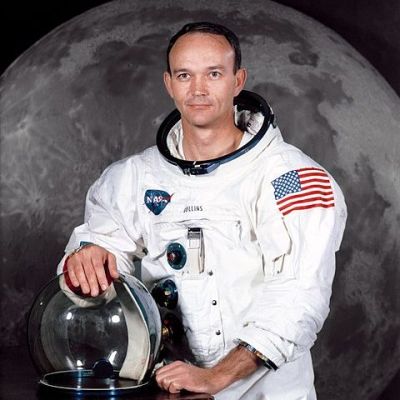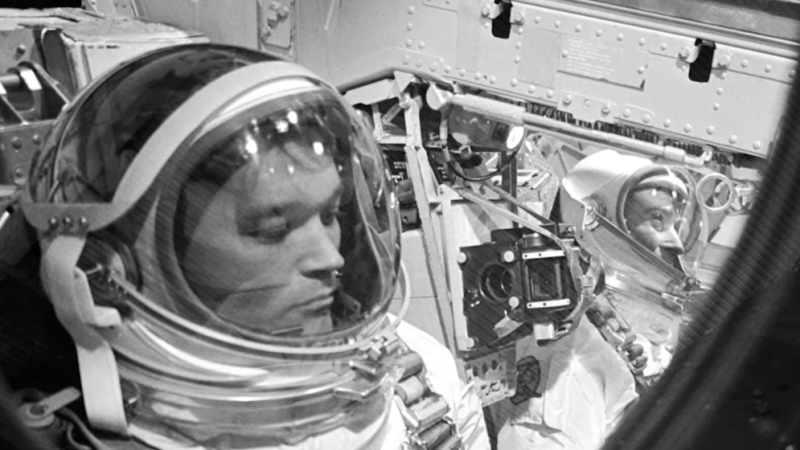With many of the achievements of the Space Race now more than half a century behind us, it’s no wonder that we’re steadily losing the men who rode the rockets of the Mercury, Gemini, and Apollo programs into space. They were all very much in their primes at the time, but no matter what you’ve accomplished in life, even if it includes a trip to the Moon, time eventually catches up to you.
Still, it was quite a shock to learn today that astronaut Michael Collins passed away today at the age of 90. Collins made his trip to the Moon aboard Apollo 11, the mission which would see his crewmates Neil Armstrong and Edwin “Buzz” Aldrin descend to the surface in the Lunar Module Eagle and take the historic first steps on its surface in July of 1969.
As Command Module pilot, Collins had the difficult job of staying in lunar orbit, keeping Columbia aloft and ready for their return. While Armstrong and Aldrin were bouncing around on the Moon, Collins was completely cut off from human contact for 48 minutes out of every two-hour orbit. Collins was not the first man to visit the far side of the Moon alone — John Young had that privilege as his crewmates Tom Stafford and Gene Cernan piloted their LM to within 16 kilometers of the lunar surface just two months before on Apollo 10. And while there’s no denying his aloneness, Collins always thought hanging the “Lonely Man” label on the Apollo CM pilots was silly. He felt energized by his time in isolation and the knowledge that he was, at times, farther away from everyone else than any human had ever been.
Collins also always maintained that, far from being the “Forgotten Man” who was robbed of his chance to leave bootprints on the surface, he felt very much a part of what was going on 60 miles below him. He knew that the mission required the efforts of three men, and that he had to hold up his end of the bargain. He was so devoted to the mission that he took it upon himself to write a book-length manual of LM rendezvous procedures, describing what to do in the event the landing didn’t go as planned. He even considered what to do if something caused Eagle to make it to only a low lunar orbit, planning out how he would pilot Columbia down to meet and rescue them.
 Happily, none of the contingencies that occupied so much of Collins’ thoughts in his time alone in Columbia came to pass, and the Apollo 11 mission completed successfully. The three astronauts would have their pick of assignments upon return, but Collins had made the decision before the mission to retire from NASA upon his return. Despite being offered a position that likely would have ended with getting his boots on the Moon as Apollo 17 commander, he felt that he had done his part in realizing President Kennedy’s vision and that his family had paid enough of a price already. He chose instead public service, first with the Department of State and later as Director of the National Air and Space Museum, which at the time of his appointment had not yet been built. He would oversee the construction of what would quickly become one of the most popular museums in the world, where millions of visitors a year file past his beloved Columbia.
Happily, none of the contingencies that occupied so much of Collins’ thoughts in his time alone in Columbia came to pass, and the Apollo 11 mission completed successfully. The three astronauts would have their pick of assignments upon return, but Collins had made the decision before the mission to retire from NASA upon his return. Despite being offered a position that likely would have ended with getting his boots on the Moon as Apollo 17 commander, he felt that he had done his part in realizing President Kennedy’s vision and that his family had paid enough of a price already. He chose instead public service, first with the Department of State and later as Director of the National Air and Space Museum, which at the time of his appointment had not yet been built. He would oversee the construction of what would quickly become one of the most popular museums in the world, where millions of visitors a year file past his beloved Columbia.
All told, Michael Collins had an amazing ride through life, from West Point to test pilot to the Gemini program and eventually to the Moon and back. His footprints may not be on the Moon, but he certainly made his mark on history.















A hero.
If you ever get a chance, watch one of his interviews. He is a delightful person. (I am sure there will be tribute videos, I am not talking about those).
He knew the apollo 11 situation was going to be a great thing for humanity, or the worst thing (moon bugs).
His sarcasm and wit are very entertaining.
He wrote what is widely considered to be among the best of spaceflight memoirs, Carrying the Fire. I can’t recommend it highly enough.
I second that recommendation. I have had that book for more than 25 years. It is still on my bookshelf.
And I can 3rd that. I first read it when it first came out, and had to buy a new copy a couple of years ago when I couldn’t find my original. It is the best of all the astronaut memoirs I’ve read. It is also much better than “The Right Stuff”. Collins had a great sense of humour and “Carrying The Fire” is very readable, both as a memoir and a record of Gemini and Apollo. He should also be remembered for steering the construction of the Air and Space Museum, and for setting the standard and tone for it’s future progress. He is one of my heroes, both as an astronaut and as a human.
As a kid, I took our space successes for granted, not even realizing how dangerous tha Apollo 13 mission was. Reading ‘Carrying the Fire’ was what taught me that every flight was a test flight, and our astronauts were hanging their asses out with every mission.
RIP, Michael Collins, and thank you.
“Wow! you’ve managed to get Neil Armstrong & Buzz Aldrin as guest speakers for your conference!”
“Yes, and we’ve also got Michael Collins circling the Conference Center in a taxi.”
—–
RIP Michael Collins, brave hero.
OK, that made me snort. I like to think Mike would have thought that was hilarious too.
All men, even heroes die, but the saddest thing is that the last time he saw men land on the moon was 50 years ago. The greatest tribute we can give to the brave men who landed on the moon all those years ago is to get our asses in gear and get back there.
My fear is that at the rate we’re losing them, we’ll have lost all the men who left bootprints on the Moon before anyone else makes fresh ones.
Same here. It saddens me to no end that those who set foot on the Moon may never see it happen again. Heck we may never attempt a manned landing again given how far we regressed in terms of capability.
Musk has grander ambitions than the moon.
The USA may not have the long-term political stability to get people back on the moon, but China has a razor sharp focus which it can keep for decades to come.
After the first moon landing, a grocery store here was selling a “portrait” of the three, I assdume it sold elsewhere too.
A cheap plastic frame, a mass produced “painting” of the three, and it was over my bed for years. Not art, but a souvenir of that first moon trip.
On The Byrds “The Ballad of Easy Rider”, there is “Armstrong, Aldrin and Collins” is an incredibly short song about the launch of Apollo 11. But they were recording the album at the time, so it’s a spontaneous reaction to the lunch (or the moon landing, it doesn’t mention the landing).
Even as a wide-eyed 12 year old watching all the BBC’s coverage of Apollo 11 on a tiny black and white VHF TV, I felt sorry for Michael Collins. But he was a true hero, and gracious in playing his part.
A few years ago, my partner had just started writing and her first short story was inspired by a prompt in a writing magazine: “What are you doing here?”. I’d just been talking to her about my childhood experience of Apollo 11 and Michael Collins.
She didn’t really like the story much after it was finished, but I did. So here it is (she’s gonna kill me for this):
https://blog.cabbiemonaco.com/2021/04/michael-collins-mission-accomplished.html
Wow, cool story! I Love it!
If he was to have his time again I reckon that he’d remember to look at the stars.
RIP to a brave and humble hero. This man passed up a chance to actually walk on the moon (Apollo 17) because of hid dedication and love for his family. They don’t make them like that anymore.
They still make them like that.
You just don’t know them, because
of their love and dedication to family!
B^)
Was a bout three years old when my dad picked me up and pointed to the moon and told me that men were landing and walking there right now. Must have been in 1971, so not the first mission, but still, I’ll never forget it.
Rest easy, Michael! You lived a life that is the envy of most of us. A life built of bravery, knowledge, dedication, integrity, and humanity all rolled into a great man. Say hey to Neil if you’re able.